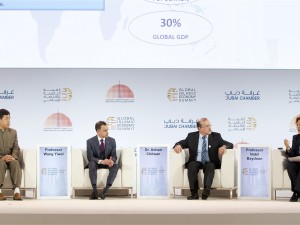China’s Belt and Road initiative is expected to have major implications on trade and investment flows among Muslim countries, according to panellists addressing the topic at the Global Islamic Economy Summit 2018 (GIES) in Dubai. Entitled ‘One Belt, One Road, – How Might We Harness the Silk Route for the Islamic Economy?’, the panel highlighted the unprecedented opportunities for the Muslim nations that are located along the New Silk Road and examined the new growth opportunities that are opening up as the major infrastructure project progresses. Held under the patronage of His Highness Sheikh Mohammed bin Rashid Al Maktoum, Vice President and Prime Minister, the UAE and Ruler, Dubai, the fourth edition of GIES is organised by Dubai Chamber of Commerce and Industry and the Dubai Islamic Economy Development Centre in cooperation with Thomson Reuters as strategic partner. Held from October 30-31, 2018, GIES attarcted the participation of over 3,000 key decision makers, policymakers, government officials, business leaders and industry experts from around the world. Launched by Chinese President Xi Jinping in 2013, Belt and Road aims to improve connectivity and cooperation between Eurasian countries. During the session, Professor Nabil Baydoun, Vice Chancellor, Academic Affairs Hamdan Bin Mohammed Smart University, Dubai, spoke about the geographical importance of what is a new ‘Silk Route’ and how the project is an integral part of the Chinese plan for their economy. “It helps China increase trade among 65 countries and its biggest advantage is that it brings China closer to the world. Each nation needs to step up and play a part in working towards Belt and Road. Chinese regulations need to open the door to the world,” he said. Professor Wang Yiwei, …
Read More »
Breaking News
- Arabian Travel Awards to kick off in November
- Jordan and South Africa to boost tourism ties, with focus on religious travel
- Rotana partners with Lighthouse to advance data-driven revenue optimisation across global portfolio
- Saudi Arabia opens doors to foreign private aviation: GACA grants VistaJet domestic operating rights
- Zayed International Airport recognised for excellence in guest experience management by ACI
- ITB Asia 2025 to focus on ME and GenZ travellers
- Qatar Tourism organizes joint workshop with Civil Service Bureau and Government Development Bureau for partners in preparation for the upcoming cruise season
- Rocco Forte Hotels and Emerald Pine Capital announce strategic partnership to drive ME and Europe expansion
- Kuwait Airways strengthens partnerships to enhance customer experience
- Ministry of Economy & Tourism participates in “Women’s Economic Dialogue” in China to enhance the global presence of Emirati women
- SalamAir expands global sales reach through dual partnership with Hahnair
 Tourism Breaking News
Tourism Breaking News
